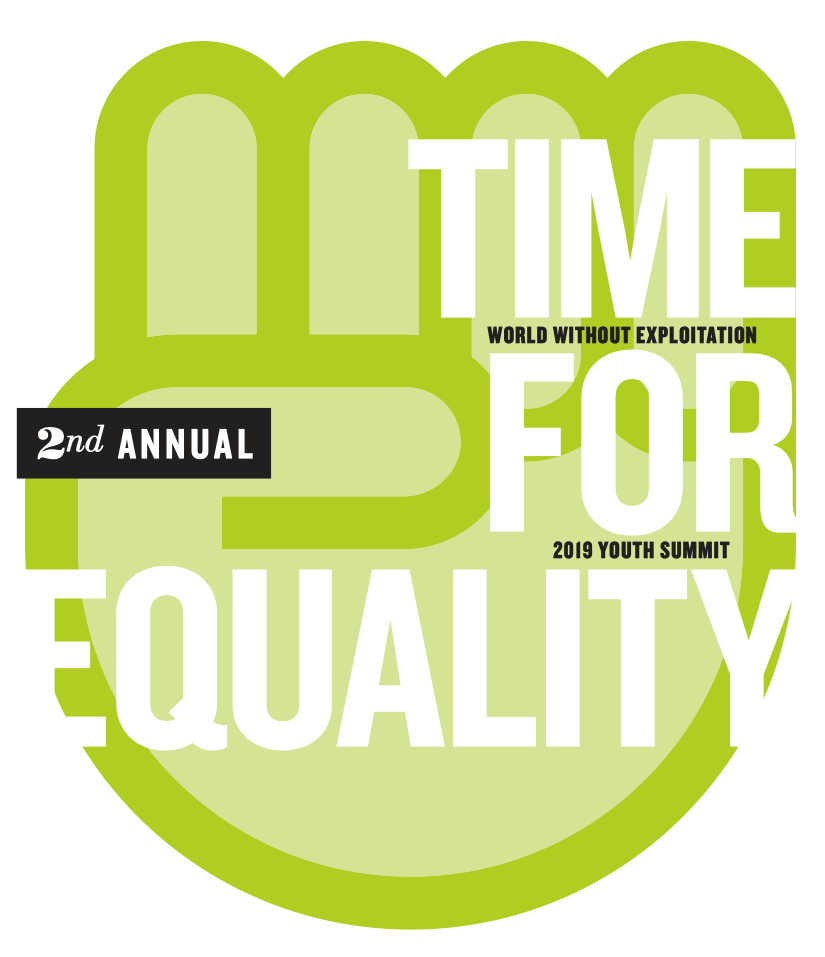On July 26, 2019, CATW, LIFT Worcester, Rights4Girls, the National Organization for Women’s New York City Chapter, Sanctuary for Families and the Voices and Faces Project co-sponsored World Without Exploitation’s Second Annual Youth Summit. The gathering’s aim? To educate and activate a new generation of advocates to fight human trafficking and sexual exploitation.
Youth activists ages 16-28 came together, alongside survivor leaders and industry experts, for a full day of panel discussions, advocacy training, and meaningful conversations on how to end the demand for prostitution, which fuels sex trafficking, in order to fight for a world of true equality.

The summit dealt with the nuances of sex trafficking, prostitution and other forms of commercial sexual exploitation. It challenged preconceived notions of human trafficking, what it looks like as well as where it takes place. Fighting the stereotypical representation of kidnapped women locked in chains in other parts of the world, the summit highlighted that human trafficking and commercial sexual exploitation happens right under our eyes in our own backyards and neighborhoods. It takes place within the problematically glamorized multi-billion dollar sex trade, which preaches prostitution as a form of empowering “work.” As the summit highlighted, however, as human rights, anti-trafficking and feminist activists, we must, instead, recognize the harm it inevitably causes in order to advocate for real, long-lasting human rights-based solutions.
In one of the panels, Alisa Bernard from the Organization of Prostitution Survivors explained that the “sex trade is the smashing point of vulnerability, capitalism, patriarchy and trauma,” where women due to their racial, gender and income inequalities are left vulnerable to exploitation. Jimmie Briggs Co-Founder of the ManUp Campaign followed up this point discussing how, due to the pervasive nature of the “sex-work” rhetoric, the lived reality of thousands of survivors and those surviving the sex trade becomes muddled by “shows like HBO’s ‘Cat House,’‘Pimps Up, Hos Down,’ ‘Pimp My Ride’ and other mainstream messages that hide sexual violence & harassment.” He pointed out, “We laugh at it, we gloss over it, instead of looking at the realities of male violence and sexual entitlement.”
Survivor leaders who spoke also highlighted how prostitution isn’t a victimless crime. They revealed how they’re still impacted by lifelong harm inflicted by pimps/traffickers and sex buyers, who are the pillars of the system of prostitution. They explained that even if someone is in prostitution and doesn’t currently acknowledge its harms, as many of them did when still in “the life,” this is inescapable in the aftermath. Some of the survivor leaders attested that, even after being able to leave prostitution, multiple parts of their lives, including romantic relationships, continue to be negatively affected by trauma. Emphasizing the long-term and lifelong aspect of this harm, survivor leader Nikki Bell, founder and CEO of LIFT Worcester, told the audience: “Exiting prostitution is not an event, but a journey.”
In recalling her experience at the Summit, Tayler Sinclair, one of our college interns, explained:
“Hearing survivor leaders speak about their experiences helped to put things into perspective and it allowed me to build upon my pre-existing knowledge about the issue. There are a lot of myths and misconceptions surrounding prostitution: ‘It’s going to be fun; I will make a lot of money; it would be like having one night stands.’
“One of the survivor leaders spoke about how pervasive this mentality is and that it couldn’t be further from the truth. This resonated with me because I know that I, along with my friends and other young people, have been socialized to think that prostitution is a door to immense wealth and exciting opportunities.”
The young audience was challenged to think deeply about these issues and to find ways to take what they learned that day to their peers.
Our summer interns in attendance, including Tayler, reflected on this challenge in conversation later:
Prostitution’s re-brand as “sex work is work” hijacks notions of self-empowerment, agency and personal choice from mainstream feminist discourses, such as the My Body My Choice campaign for reproductive rights.
Many who are socially conscious, particularly younger generations like ours and millennials, buy into this narrative because it seems progressive on the surface. However, one of the panelists brought up a good point — it’s not progressive to decriminalize sex buyers and pimps so that people in prostitution, including trans and gender non-conforming individuals trying to survive (who are often under the age of 18 at the time and sex trafficking victims being bought by older men with expendable income), won’t be arrested. There has to be other ways to uplift marginalized communities. The people this full decriminalization of the sex trade movement claims to protect and serve are the very same ones who would be deeply hurt by a policy removing accountability from pimps and sex buyers who perpetrate harm and violence that has lasting consequences.
Full decriminalization of prostitution — the removal of criminal penalties from sex buyers, pimps/traffickers and other third party exploiters — legitimizes sexual exploitation. It normalizes the commodification of black and brown bodies. If more young people realized this and made these connections, they wouldn’t be able to say with a clear conscience that “sex work” should be decriminalized. They would understand that this actually means that those facilitating the sex trade and inflicting long-term harm and trauma (pimps, brothel owners and managers, escort service owners and sex buyers) wouldn’t be prosecuted. They would realize that the real progressive policy is to ensure people in prostitution are not criminalized or incarcerated and have access to non-judgmental services (including exit strategies if they want them), not to decriminalize pimps/traffickers and sex buyers. Reaching our peers where they are and educating them about these elements is key.


